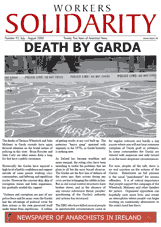Over 30 years of anarchist writing from Ireland listed under hundreds of topics
Class & Anarchism
Why are anarchists always dragging class into everything? Isn’t class struggle something more at home in a history book than in Celtic Tiger Ireland? After all you don’t see too many downtrodden workers wandering around in donkey jackets, cloth caps and heavy boots.
Instead, lots of us go to Turkey, Morocco or even the US for our holidays. And hardly anyone eats bread and dripping in 2006.
So that settles the question, doesn’t it? Well, no (what else did you expect me to write!). The ruling class would love us to think was class was no more; that we are all the same and it’s the courageous and ‘enterprising’ who get on in life.
Sadly, in the real world, there is no single ‘humanity’, not yet. In every country there is still a division of people into classes, and these classes have conflicting interests.
Classes are defined by their relationship to the “means of production”; their relationship to the factories, machinery, natural resources, etc. with which the wealth of society is created. Although there are groups like self-employed and small farmers, the main classes are the workers and the bosses.
It is the labour of the working class that creates wealth. The bosses, through their ownership and control of the means of production, have legal ownership of this wealth and decide how it is to be distributed.
Only a part of this wealth is returned. Some is paid as wages, some as the “social wage” (hospitals, schools, public services, and so on). The rest is creamed off as profit. But labour creates all wealth. An apple on a tree is worth nothing until someone picks it, coal in the ground has no use until someone mines it. What is known as “surplus value” or profit is stolen wages.
The working class is the majority in Ireland today. All who work for a wage, salary or commission are in its ranks. It consists of all who have to sell their ability to work. It makes no difference if you work in a factory, office, school, hospital or shop. It makes no difference if you work with your hands or your head, whether you wear overalls or a suit, whether you earn ‘good’ or bad wages.
The unemployed also form part of the working class. Social welfare payments are made to those who have worked and those who may potentially provide some employer with their labour power. It is a condition of payment that a claimant is “available for and actively seeking work”. Needless to say, the partners and children of workers are also part of the same class, as are the retired.
The interests of the working class (wages, working conditions, jobs, useful public spending, etc.) are in constant and inevitable conflict with those of the boss class. They want to maximise their profits and gain an advantage over their competitors, and what better way than to cut wage costs?
Although capitalism can give people a hard time on many different levels, race and sex to name but two; it is the exploitation of our labour that is fundamental to the system. If we can reclaim that aspect of our lives, the system can be overturned and replaced with something much better.
However just because someone is a worker it does not always follow that he or she will think of themself as a worker, or realise the potential for change that the working class collectively possesses. We all know people who identify with their boss, or others who become isolated from any sense of belonging to anything bigger than their own family and a few close friends.
Class consciousness, an awareness of our common interests and the potential we have for real change, needs to be encouraged and strengthened. This is one of the tasks of an anarchist organisation.
Only when direct control and management of production is taken by the working class themselves will we end the class division. In such a society wealth would be created and managed for the benefit of all. There would be no elite of bosses or rulers; instead, everyone affected by a decision could have a say in making that decision. What people need and want will be the guiding principle, not the interests of a few very wealthy shareholders.
And that’s when we will stop “dragging class into everything”
|
This article is from You can download the PDF file of WS92 |
 |

